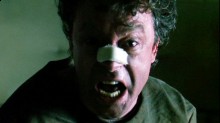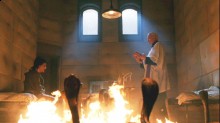William Peter Blatty’s The Exorcist III (1990) is one of the unsung gems of the horror genre. For my money, it’s everything The Exorcist (1973) should have been, but never quite was. The superb cast is a help, but it’s really the dense atmosphere of almost tangible evil from both Blatty’s screenplay (from his novel Legion) and his direction that makes it stand out. It’s almost impossible not to believe in demonic possession while the film is on the screen—not to mention boasting perhaps the greatest shock effect of all time. But more, it’s also a very witty and deeply philosophical film.

Considering how popular the original Exorcist film had been, it’s curious that Warner Bros. didn’t head for Blatty when they wanted to make a sequel, but it’s even more curious that they opted for Exorcist II: The Heretic, which came out in 1977—a not-very-horrific work from John Boorman. Boorman told the studio that he hated the original film and was only interested in making a kind of anti-Exorcist, so they paid him a million bucks and told him to go ahead. Why? No one really knows, but he handed them a box-office disaster that might best be described as a $14.5 million art movie. (And $14.5 million was a large price for a movie in 1977.)

Blatty then published Legion in 1983 and it would become the source for The Exorcist III in 1990—only this time for Morgan Creek Productions with a 20th Century Fox release and Blatty in charge. Blatty had proved himself a natural filmmaker with The Ninth Configuration (1979), so it wasn’t that surprising he would direct his own material—and this time it would be his own material. William Friedkin wouldn’t be there to cut out Blatty’s deeper musings on the nature of God and good and evil as had happened on The Exorcist. (See the restored Exorcist 2000 with some of Blatty’s material put back in to get an idea of what went astray.) In the end, Blatty had to compromise on the ending, providing a bigger, scarier (and frankly better) one than the book, but his thematic concerns remained intact.

Conveniently, the story works whether or not you factor in Exorcist II, since that film followed the Regan (Linda Blair) character, while Blatty’s story concerns Lt. Kinderman (here played by George C. Scott) and Fr. Damien Karras (Jason Miller)—even though the latter had been killed at the end of The Exorcist. In this take, Karras’ body was taken over—with some Satanic intervention—by the spirit of the executed Gemini Killer (Brad Dourif), who years later has mastered the body and starts his killing anew through controlling patients in the geriatric ward of the hospital where he’s incarcerated in the mental ward. (Yes, it does owe something to Fritz Lang’s 1932 The Testament of Dr. Mabuse.)

The resulting film is astonishingly powerful thanks to its strong sense of conviction—not to mention George C. Scott’s amazing performance as Kinderman and Brad Dourif’s truly terrifying turn as the Gemini Killer. (Watch his performance and tell me Heath Ledger hadn’t seen it before he tackled the Joker in The Dark Knight (2008).) But much of the film’s persuasive creepiness is due to Blatty’s script and his flawless direction. This isn’t a case of a writer who is directing. This is the work of a true filmmaker, whose cinematic sense is every bit the equal of his literary one. Even if the atmosphere didn’t tell you that, his creation of the scene involving the white-robed figure would. This is masterful filmmaking that gives the final scene of Brian De Palma’s Carrie (1976) a run for its money in the audience-jumping department. Come and see it for yourself—if you think you’re up to it. Oh, and by the way, Brad Dourif’s line about his activities being “child’s play” is not an in-joke referring to his playing Chucky in the Child’s Play movies. It’s straight out of the novel. Talk about serendipity.
Also, this week the Thursday Horror Picture Show will kick off the evening’s pre-show entertainment (starting about 7:40 p.m.) with chapter one of the 1934 Bela Lugosi serial The Return of Chandu (“in 12 thrilling chapters”), so you might want to plan to get there early.




Before you comment
The comments section is here to provide a platform for civil dialogue on the issues we face together as a local community. Xpress is committed to offering this platform for all voices, but when the tone of the discussion gets nasty or strays off topic, we believe many people choose not to participate. Xpress editors are determined to moderate comments to ensure a constructive interchange is maintained. All comments judged not to be in keeping with the spirit of civil discourse will be removed and repeat violators will be banned. See here for our terms of service. Thank you for being part of this effort to promote respectful discussion.